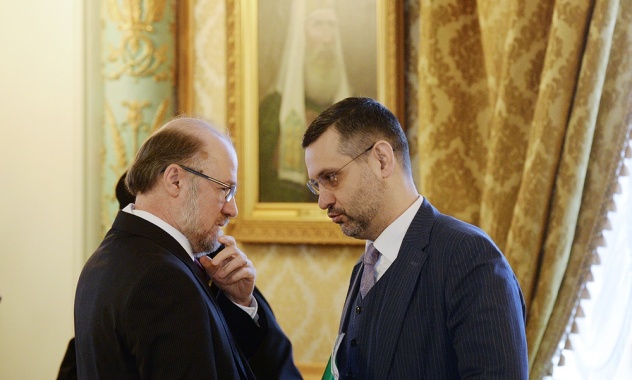Supreme Church Council of the Russian Orthodox Church meets under chairmanship of Patriarch Kirill
On March 23, 2016, the Supreme Church Council of the Russian Orthodox Church has begun its meeting at the Supreme Church Council hall in the Cathedral Church of Christ the Saviour in Moscow. It is chaired by His Holiness Patriarch Kirill of Moscow and All Russia.
Opening the meeting, His Holiness expressed condolences to the families and friends of those who were killed in the terror actions in the Belgian capital city of Brussels. Addressing the meeting the Primate of the Russian Orthodox Church said in particular,
‘We have the first-hand knowledge what terror is and we know what the suffering of people is, who are killed in the name of a very strange understanding of how one should struggle for achieving one’s earthly goals. I believe we are to reflect very seriously and theologically on the phenomenon of terrorism.
‘All the explanations present in the political discourse are superficial. I cannot get rid of the feeling that nobody really looks into the ontological depths of the problem. Where this radicalism come from? What nourishes it? What external factors influence the motivation for terrorist activity?
I believe terrorism cannot be separated from the general civilizational development at the present stage in the historical journey of humanity. Something has gone wrong with us, and terrorism is a part of this wrongness. If terrorism is considered to be some local phenomenon or even global but connected with a very limited ideological space, it will be a great mistake. I believe it is necessary to interpret this terrible phenomenon theologically and cultorologically and to identify, as I have already said, its ontological causes.
‘Along with the condolences we express hope that the authorities in Belgium, in western European countries and in each place where there is a threat of terrorism will act as actively as possible, and in cooperation with one another at that. If terrorism is a global phenomenon, then the response must me global as well. There must be coordination of efforts. Much is spoken about it today, but unfortunately there is still no full coordination of actions on the part of all those who are called to struggle with terrorism on the global scale.
‘As far as the Church is concerned, we should do our principal job, which is to pray, ask the Lord to forgive our sins, to invoke His mercy and pray for the support of all those who have suffered from these terrorist wounds. However, at the same time, we should engage in very serious thinking. And since all the reflections in the Church are always linked with prayers, it gives us hope that we will be able to understand the real causes of this terrible phenomenon and work out our own response to the challenge of terrorism. As usual, some will agree with this response, others will not, some will welcome it, others will speak ironically of it. But the reaction to our words is not our responsibility. Our responsibility is to think, pray and do all possible to make the world a better place, because concern for the world around us is part of our concern for the salvation of the human race’.
Patriarch Kirill and members of the meeting paid homage to those who were killed in the terror actions by a silence minute and a prayer for the repose of their souls.
Then Patriarch Kirill presented the agenda, which included the following items:
- On the implementation of the decisions of the Supreme Church Council of the Russian Orthodox Church and the Bishops’ Council;
- On the work carried out by the synodal departments in 2015. Discussion on their reports;
Metropolitan Mercury of Rostov and Novocherkassk made a report about the approval of the date and venue of the 2017 Christmas Readings.
The Supreme Church Council chaired by His Holiness the Patriarch consists of:
Metropolitan Varsonofy of St. Petersburg and Ladoga, chancellor of the Moscow Patriarchate;
Metropolitan Hilarion of Volokolamsk, chairman of the Department for External Church Relations;
Metropolitan Clement of Kaluga and Borovsk, chairman of the ROC Publishing Council;
Metropolitan Ioann of Belgorod and Stary Oskol, chairman of the Synodal Department for Mission;
Metropolitan Merkury of Rostov and Novocherkassk, chairman of the Synodal Department for Education and Catechization;
Metropolitan Mark of Ryazan and Mikhailovsk, chairman of the Moscow Patriarchate’s Finance and Economic Administration;
Metropolitan Kirill of Stavropol and Nevinnomyssk, chairman of the Synodal Department for Relations with the Cossacks;
Archbishop Yevgeny of Vereya, chairman of the Holy Synod’s Education Committee;
Archbishop Feognost of Sergiev Posad, chairman of the Synodal Department for Monasteries and Monasticism;
Bishop Sergy of Solnechnogorsk, head of the Moscow Patriarchate’s Administrative Secretariat;
Bishop Irinarkh of Krasnogorsk, head of the Synodal Department for Prison Ministry;
Bishop Ignaty of Vyborg and Priozersk, chairman of the Synodal Department for Youth Affairs;
Bishop Panteleimon of Orekhovo-Zuevo, chairman of the Synodal Department for Church Charity and Social Ministry;
Bishop Tikhon of Yegorievsk, executive secretary of the Patriarchal Council for Culture;
Bishop Antony of Bogorodskoe, head of the Administration of the Moscow Patriarchate’s Institutions Abroad;
Archpriest Sergy Privalov, acting chairman of the Synodal Department for Cooperation with the Armed Forces and Law Enforcement Agencies;
Archpriest Dimitry Smirnov, chairman of the Patriarchal Commission for Family and Protection of Motherhood and Childhood;
Mr. Vladimir Legoida, chairman of the Synodal department for the Church’s Relation with the State and Mass Media.
Invited to attend the session were Bishop Savva of Voskresensk, first deputy chancellor of the Moscow Patriarchate; Archimandrite Savva (Tutunov), deputy head of the ROC Education Committee; Hieromonk Onisim (Bamblevsky), head of the Moscow diocesan Department for Religious Education and Catechism; Sister Xenia (Chernega), head of the Moscow Patriarchate legal service; A. Schipkov, deputy head of the Synodal Department for the Church’s Relations with the State and the Mass Media.
Patriarchal Press Service
DECR Communication Service


















